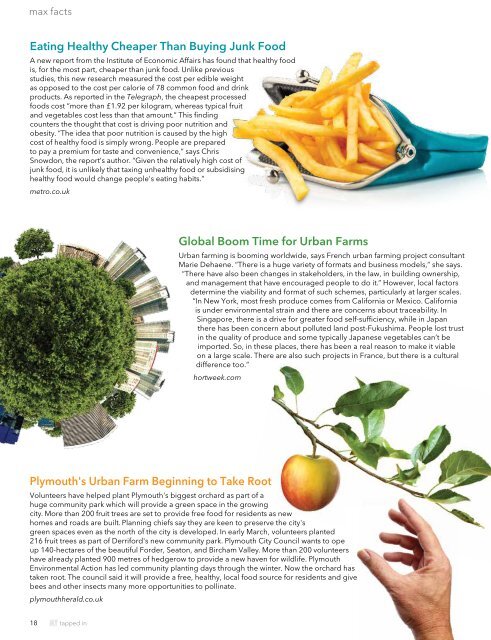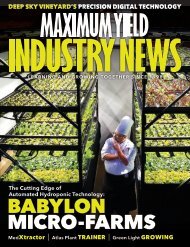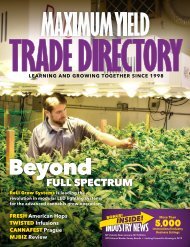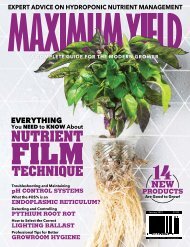Maximum Yield Modern Growing | UK EU Edition | May June 2017
In this issue of Maximum Yield, we cast a wide net to bring you the best and latest information possible to help you get started growing your own food. From the basics like cleaning your equipment to the best methods for preparing your plants to live outdoors, to more advanced topics like lighting and nutrient delivery, there is something in this issue for all levels of grower.
In this issue of Maximum Yield, we cast a wide net to bring you the best and latest information possible to help you get started growing your own food. From the basics like cleaning your equipment to the best methods for preparing your plants to live outdoors, to more advanced topics like lighting and nutrient delivery, there is something in this issue for all levels of grower.
You also want an ePaper? Increase the reach of your titles
YUMPU automatically turns print PDFs into web optimized ePapers that Google loves.
max facts<br />
Eating Healthy Cheaper Than Buying Junk Food<br />
A new report from the Institute of Economic Affairs has found that healthy food<br />
is, for the most part, cheaper than junk food. Unlike previous<br />
studies, this new research measured the cost per edible weight<br />
as opposed to the cost per calorie of 78 common food and drink<br />
products. As reported in the Telegraph, the cheapest processed<br />
foods cost “more than £1.92 per kilogram, whereas typical fruit<br />
and vegetables cost less than that amount.” This finding<br />
counters the thought that cost is driving poor nutrition and<br />
obesity. “The idea that poor nutrition is caused by the high<br />
cost of healthy food is simply wrong. People are prepared<br />
to pay a premium for taste and convenience,” says Chris<br />
Snowdon, the report’s author. “Given the relatively high cost of<br />
junk food, it is unlikely that taxing unhealthy food or subsidising<br />
healthy food would change people's eating habits.”<br />
metro.co.uk<br />
Global Boom Time for Urban Farms<br />
Urban farming is booming worldwide, says French urban farming project consultant<br />
Marie Dehaene. “There is a huge variety of formats and business models,” she says.<br />
“There have also been changes in stakeholders, in the law, in building ownership,<br />
and management that have encouraged people to do it.” However, local factors<br />
determine the viability and format of such schemes, particularly at larger scales.<br />
“In New York, most fresh produce comes from California or Mexico. California<br />
is under environmental strain and there are concerns about traceability. In<br />
Singapore, there is a drive for greater food self-sufficiency, while in Japan<br />
there has been concern about polluted land post-Fukushima. People lost trust<br />
in the quality of produce and some typically Japanese vegetables can’t be<br />
imported. So, in these places, there has been a real reason to make it viable<br />
on a large scale. There are also such projects in France, but there is a cultural<br />
difference too.”<br />
hortweek.com<br />
Plymouth's Urban Farm Beginning to Take Root<br />
Volunteers have helped plant Plymouth's biggest orchard as part of a<br />
huge community park which will provide a green space in the growing<br />
city. More than 200 fruit trees are set to provide free food for residents as new<br />
homes and roads are built. Planning chiefs say they are keen to preserve the city's<br />
green spaces even as the north of the city is developed. In early March, volunteers planted<br />
216 fruit trees as part of Derriford's new community park. Plymouth City Council wants to open<br />
up 140-hectares of the beautiful Forder, Seaton, and Bircham Valley. More than 200 volunteers<br />
have already planted 900 metres of hedgerow to provide a new haven for wildlife. Plymouth<br />
Environmental Action has led community planting days through the winter. Now the orchard has<br />
taken root. The council said it will provide a free, healthy, local food source for residents and give<br />
bees and other insects many more opportunities to pollinate.<br />
plymouthherald.co.uk<br />
18 tapped in


















